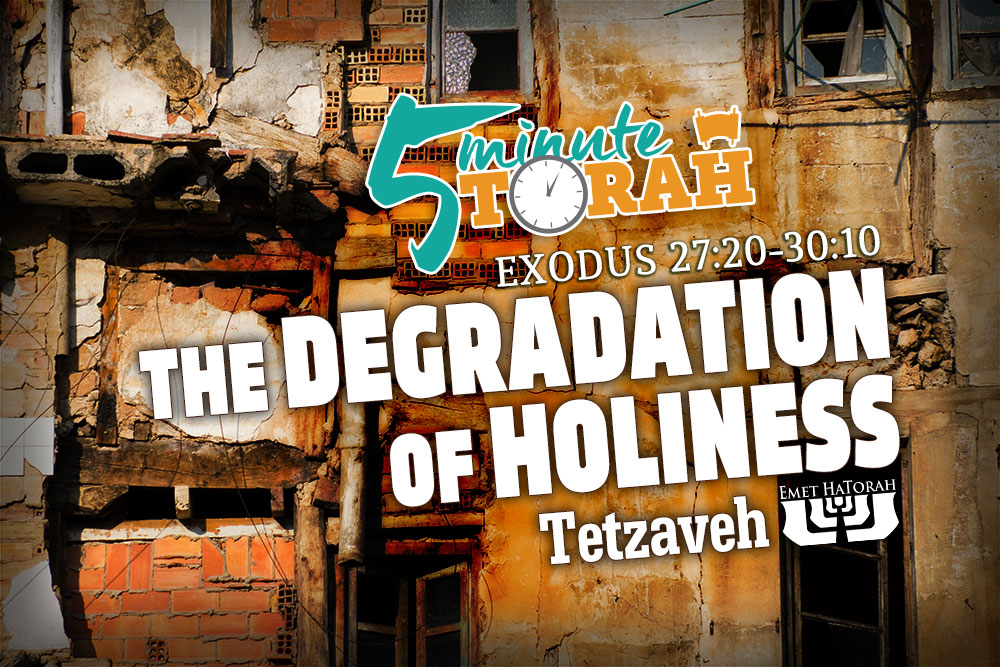Parashat Tetzaveh - Exodus 27:20-30:10
Series:

The Degradation of Holiness
After the instructions for making the oil for the Temple menorah, parashat Tetzave is primarily focused on the consecration of the kohanim (priests), including how their priestly garments are to be tailored. As part of the consecration ceremony, Aaron and his sons are instructed to offer up a ram and eat it at the entrance of the Tent of Meeting:
You shall take the ram of ordination and boil its flesh in a holy place. And Aaron and his sons shall eat the flesh of the ram and the bread that is in the basket in the entrance of the tent of meeting. They shall eat those things with which atonement was made at their ordination and consecration, but an outsider shall not eat of them, because they are holy. (Exodus 29:31–33)
According to this passage, the ram served three purposes. It was for atonement, ordination, and consecration. The priests were commanded to eat it, but it was forbidden to outsiders. Leviticus 22:10 reinforces this saying, “A lay person shall not eat of a holy thing; no foreign guest of the priest or hired worker shall eat of a holy thing.” These instructions sound similar to Paul’s instruction for partaking of what is commonly called the Lord’s Supper:
Whoever, therefore, eats the bread or drinks the cup of the Lord in an unworthy manner will be guilty concerning the body and blood of the Lord … For anyone who eats and drinks without discerning the body eats and drinks judgment on himself. (1 Corinthians 11:27, 29)
The Didache (one of the earliest testimonies to the teachings of the Apostles outside of the Apostolic canon) interprets this prohibition narrowly to mean those who have not come to faith in Yeshua:
Let no one eat or drink of your thanks-giving except those who have been baptized in the name of the Lord, for the Lord has said, “Do not give that which is holy to the dogs.” (Didache 9:5)
Like the food consecrated for the priests, these elements are forbidden to “outsiders,” or those who are not within the boundaries of the sacred fellowship. Yeshua offered up both his body and his blood to make atonement on our behalf. Therefore, since the bread and the wine Yeshua’s followers partake of memorialize his death, resurrection, and return, the Apostles treated them with a similar sanctity as the food reserved for the priesthood. They were given a degree of holiness, and holy things require protective boundaries to ensure their sanctity will not be compromised.
The concept is difficult for us to grasp because we live in a culture that has lost its understanding of holiness. To be holy means to be set apart to God for a specific purpose. Modern man is uncomfortable with the idea that some things are sacred because it immediately implies that others are not. People don’t like being different than those around them. It’s human nature to succumb to peer pressure and adopt a herd mentality, rather than to stand out from the crowd. It even seems that modern religion has made it its goal to desanctify the sacred. In a society obsessed with equality, we find the idea of a religion that contains elements that are unaccessible to the masses unacceptable. Therefore, today’s clergy is working harder and harder to be as cool and casual as their congregants in order to avoid any traces of distinction.
The fuller context of what Yeshua said about giving holy things to dogs is:
Do not give dogs what is holy, and do not throw your pearls before pigs, lest they trample them underfoot and turn to attack you. (Matthew 7:6)
Yeshua’s words are coming to pass. We have lost a respect for the sacred in our generation and Judaism and Christianity are a constant target of attack. Why? We have ignored our Master’s teachings and placed what is holy into the laps of dogs and pigs. The same thing has happened in our generation that happened in the days of the prophet Isaiah. The concept of holiness has been distorted through hypocrisy and those who do not live up to the holiness they claim to be representing. Isaiah’s rebuke against these people is where we get the phrase “holier than thou” (from the King James):
I spread out my hands all the day to a rebellious people, who walk in a way that is not good, following their own devices … who say, “Keep to yourself, do not come near me, for I am too holy for you.” (Isaiah 65:2, 5)
In Isaiah’s day, the people who claimed a status of holiness were the ones who were living completely contrary to God’s standard of righteousness. They wanted to be set apart, but they weren’t willing to live according to the standard associated with this level of sanctity. This is a constant struggle among the people of God. Unfortunately, our current way of remedying this problem has been to invalidate holiness as a whole, rather than to elevate it. How do we turn the tide on this? Maybe we should begin by taking our Master’s words to heart and treat holy time, holy space, and holy objects with the sanctity they deserve. Maybe this will begin to show the world the beauty of holiness rather than the ugliness of hypocrisy.








